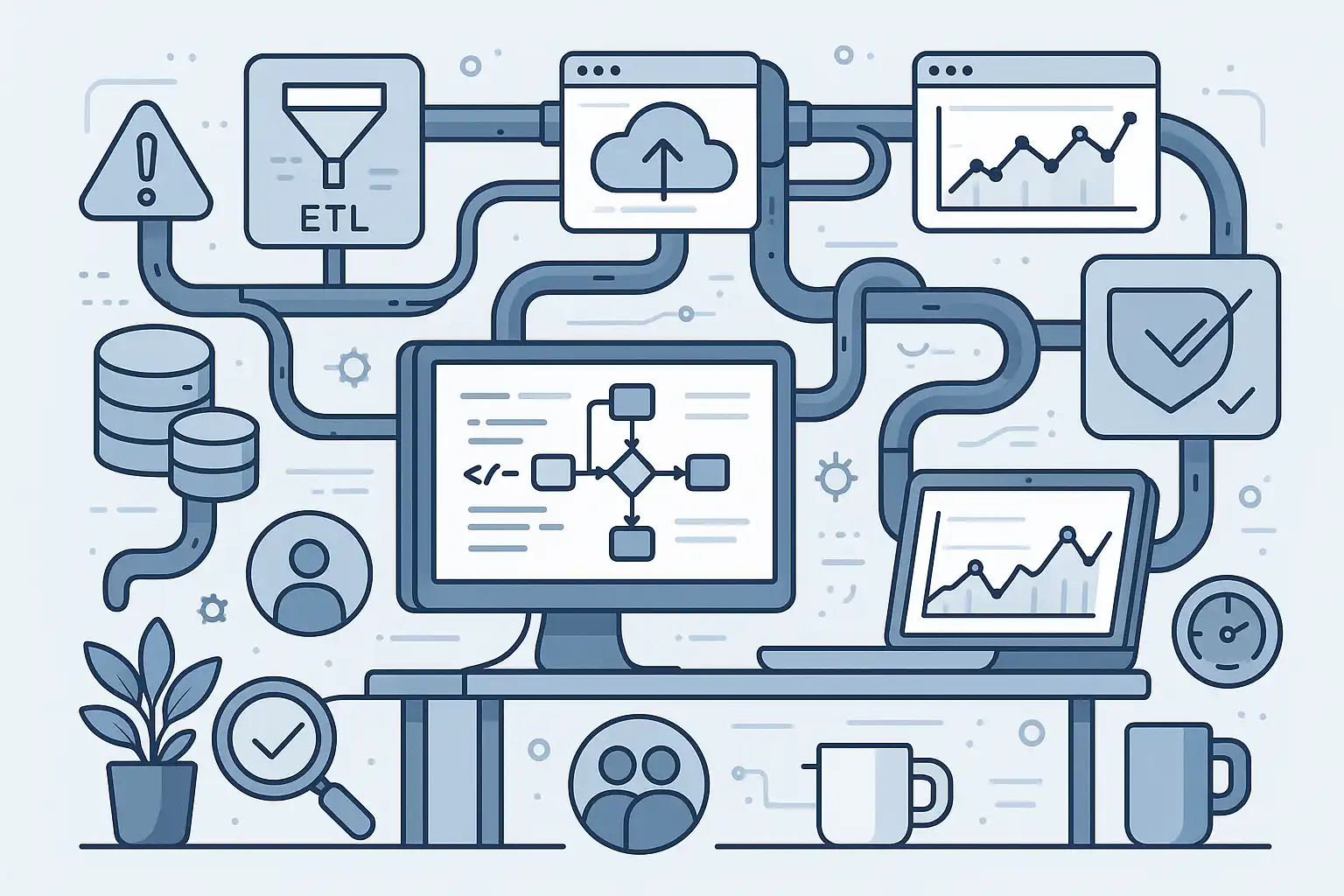
Are you preparing for a data support engineer interview? Understanding the common data support engineer interview questions can give you a real advantage. In these interviews, you’ll usually encounter a mix of technical, scenario-based, and behavioral topics. Let’s dive straight into what you should expect, how to approach sample questions and answers, and how to stand out during your interview process.
What are the most frequently asked data support engineer interview questions?
Interviewers often focus on core technical skills, real-world problem solving, and teamwork abilities. Here are some of the most commonly asked data support engineer interview questions:
- What are your primary daily responsibilities as a data support engineer?
- Can you describe your experience with SQL, Python, or other programming languages relevant to data engineering?
- What is the difference between a star schema and a snowflake schema in data modeling?
- How do OLAP and OLTP databases differ?
- How do you handle missing or corrupted data in a dataset?
- Can you walk through a complex data project you managed?
- What methods do you use to ensure data quality and integrity?
In addition, you might find technical assessments or practical scenarios, such as troubleshooting a failing ETL pipeline or optimizing a SQL query. Behavioral questions also play a big role. Interviewers want to see how you work with teams, manage stakeholders, and solve problems under pressure.
Sample Technical Questions and Answers
Let’s review some sample responses that interviewers expect:
- What are your daily responsibilities as a data support engineer?
Answer: My typical day involves monitoring data pipelines, responding to data incidents, and troubleshooting ETL jobs. I ensure data flows correctly through all stages, from ingestion to storage. For example, I check Airflow jobs, investigate failed tasks, and communicate with data analysts to clarify issues. I also document fixes and participate in regular team meetings. - Explain your technical skills relevant to data engineering, such as SQL and ETL tools.
Answer: I am proficient in SQL for querying relational databases and have experience writing Python scripts for data transformation. I have worked with ETL tools like Apache Airflow and Talend, orchestrating data workflows across various sources and targets. For instance, I built a pipeline that extracts data from PostgreSQL, applies cleaning steps, and loads it to a Redshift warehouse. - Describe the difference between star schema and snowflake schema.
Answer: In a star schema, the central fact table connects directly to dimension tables, making queries simpler and faster. In a snowflake schema, dimension tables are further normalized into sub-tables, saving storage but potentially making queries more complex. Star schemas are popular for dashboarding, while snowflake schemas can help reduce redundancy in large warehouses. - How do you fix missing or corrupted data?
Answer: First, I identify the scope of the issue by running data validation queries or using data quality tools. Next, I trace the root cause—sometimes it’s a source data problem or a failed transformation step. I might use backfilling techniques or impute missing values using statistical methods. Communication is crucial, so I keep stakeholders informed throughout the process and document all changes.
When you answer, support your claims with examples or short code snippets. For SQL deduplication, you might write a simple SELECT DISTINCT query. For ETL troubleshooting, describe using logs and dependency graphs to locate failures.

How do you prepare effectively for a data support engineer interview?
Preparation should focus on both technical knowledge and real-world examples. Start by reviewing the basics of data modeling, data processing workflows, and ETL orchestration. Get comfortable with Python and SQL, practicing with real datasets. Consider studying the data science workflow guide to see practical methods used in the industry.
Here’s a step-by-step approach to get ready:
- Review core concepts: Brush up on data warehouses, data lakes, and differences between OLAP (analytical) and OLTP (transactional) systems.
- Practice technical questions: Use sample questions to structure your answers. For each, explain the background, your process, and the results. Include specifics like tools (e.g., Hadoop, Kafka) or code.
- Explain past projects: Prepare to discuss a project where you solved a tough data issue, optimized an ETL workflow, or improved data processing workflows for efficiency.
- Prepare for behavioral questions: Think about teamwork, adaptation to new tools, handling deadlines, and communicating technical details to non-technical colleagues.
- Study compliance and governance: Know how to handle sensitive data and regulatory requirements (like GDPR) that relate to data quality and protection.
Mock interviews or practice explaining your answers aloud can sharpen your communication. Use feedback to refine your examples until they are clear, concise, and confident.
Competencies Assessed in Data Support Engineer Interviews
Interviews are designed to evaluate both technical and behavioral competencies. Technical areas typically include:
- ETL tools (Apache Airflow, Talend, Informatica)
- Programming in Python, SQL, or shell scripting
- Understanding of data modeling—especially in analytics and warehousing
- Solving real-world data issues such as deduplication, validation, and recovery
- Working knowledge of OLAP/OLTP databases and orchestration tools
Behavioral skills include problem-solving, decision-making, stakeholder management, and adaptability. You may be asked how you prioritize tasks when deadlines clash or how you approach disaster recovery planning for critical data systems.
What is the best way to answer data quality and integrity questions?
Ensuring data quality is a core part of the data support engineer role. Interviewers want to see that you use proactive and reactive strategies to maintain clean, reliable data. For instance, you can describe:
- Validating incoming data at each step using automated scripts or data quality tools
- Implementing monitoring to catch anomalies in real time
- Performing regular audits and cleaning historical data if needed
- Communicating issues promptly to both technical and business stakeholders
To illustrate, say you’re asked, “How do you ensure data integrity?” You could answer that you set up automated checks for duplicates, nulls, and out-of-range values in ETL scripts. You conduct scheduled reviews, document any changes, and collaborate with the data team for larger fixes. In more complex systems, leveraging data quality assessment frameworks can support ongoing improvements.
Behavioral Question Example
Suppose the interviewer asks, “Describe a time you handled a data incident during a critical deadline.” A strong response might be:
During a high-stakes reporting week, a key ETL job failed overnight. I quickly used logs and monitoring dashboards to pinpoint a data schema change upstream. I communicated the issue to the business team, provided a workaround with a manual fix, and coordinated a permanent solution with the development team. This approach minimized disruption and built trust with stakeholders.
Which brands and tools are relevant for the data support engineer role?
Modern data support engineers typically work with a variety of brands and tools. Examples include:
- Cloud data warehouses, such as Amazon Redshift, Google BigQuery, and Snowflake
- ETL and orchestration tools: Apache Airflow, Talend, Informatica
- Big data platforms like Hadoop and Spark
- Streaming tools, such as Apache Kafka and AWS Kinesis
- Relational databases (PostgreSQL, MySQL, Microsoft SQL Server)
- Monitoring and alerting systems (Prometheus, Grafana, Datadog)
For a deeper understanding of the integration between engineering and analytics, you may want to explore a professional data science service that provides hands-on project exposure.
Key Differences: Technical and Behavioral Questions
Technical questions evaluate your ability to design, troubleshoot, and optimize data systems. Behavioral questions, on the other hand, probe your communication, adaptability, and leadership. Companies value candidates who can balance both areas effectively, ensuring resilience and business alignment.

Frequently Asked Questions
What should I focus on when preparing for data support engineer interview questions?
Prioritize understanding data engineering basics, practicing sample questions, and being ready to explain both technical and real-world scenarios with clarity. Focus equally on technical skills and communication.
How much coding is required for the data support engineer role?
You’ll need solid skills in SQL and at least one programming language like Python. The depth of coding depends on the company’s data stack, but the ability to write and debug scripts is usually expected.
Do I need experience with specific ETL or orchestration tools?
Familiarity with popular tools like Airflow, Talend, or Informatica is beneficial. Be prepared to explain projects where you used these tools and how they helped automate or improve reliability in data workflows.
How can I show I am a good fit for a data support engineer position?
Highlight your technical skills, problem-solving strategies, and ability to communicate with different teams. Give practical examples from past projects, and show a willingness to learn and adapt as technologies evolve.
